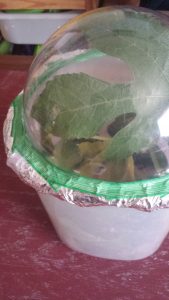 About a month ago, the kids and I were on the front porch when a very, very loud buzzing sound flew past my head. I thought it must be a cicada, but later that afternoon I discovered Figwort hiding amongst the tomatoes in our garden. He was easy enough to capture and the kids and I fashioned a makeshift habitat for him.
About a month ago, the kids and I were on the front porch when a very, very loud buzzing sound flew past my head. I thought it must be a cicada, but later that afternoon I discovered Figwort hiding amongst the tomatoes in our garden. He was easy enough to capture and the kids and I fashioned a makeshift habitat for him.
The first task was to identify the little critter. After some searching through insect books and online sources, we discovered that he was a Fig Scarab, commonly found in Mexico and the Southwestern US. Yes, we do have fig trees in our backyard, so that part made sense, but we live in Northern California. The kids and I engaged the assistance of the Hub who discovered that while our little Figwort was not native to our area and by himself he could polish off several figs or even a whole pomegranate in a single evening, this species of beetle cannot survive in moist climates. So, as soon as the El Nino rains come this winter (hopefully) and California’s dry spell subsides, Figwort and his kind will move back to southern climates.
My daughter told me that scarab beetles were viewed as good luck to keep in a household.
My son just loved the way Figwort’s shell glistened with all the colors of the rainbow.
And our cats absolutely loved how Figwort noisily flew and bumped and buzzed through the evening and late into the night.
In case you haven’t guessed, we named him after little pig Figwort who just couldn’t get to sleep (a favorite picture book that we read our kids when they were small).
The sad end to the story is that after about a month of glory and many, many devoured figs, Figwort passed away. In fact, I suspect he drowned in a fig but it was hard to tell as he just sort of disappeared into the sand and leaves at the bottom of his terrarium. We all think that Figwort might have been a she and might have very well laid eggs in the leaf litter, or perhaps in an uneaten fig.
And if we don’t get rain this winter, at least we may see Figwort’s children roaming the garden next summer…







